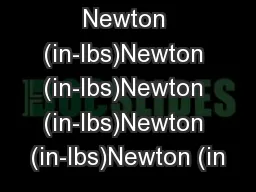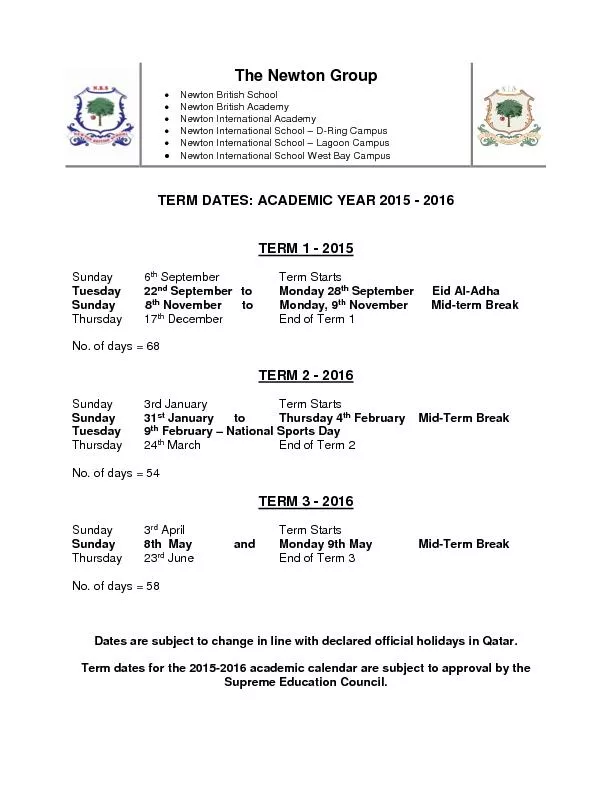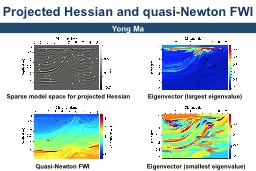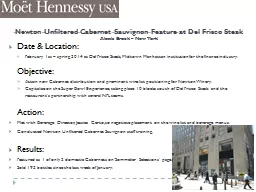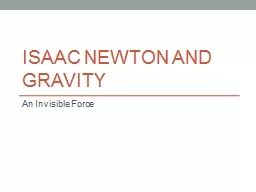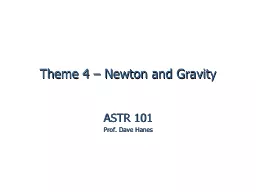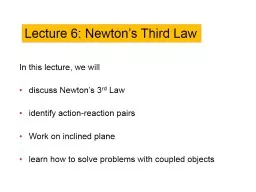Search Results for 'Newton'
Newton published presentations and documents on DocSlides.
Newton (in-lbs)Newton (in-lbs)Newton (in-lbs)Newton (in-lbs)Newton (in
1 = 8.85 32 = 283.22 63 = 557.60 94 = 831.97 125 =...
How is Newton method sensitive to
starting . point. MATH. . 6630. By. . Morgan. ...
Newton at 46
To Cambridge University . sizar. in 1661 . Plag...
Newton Group
The Newton British School Newto...
Projected Hessian and quasi-Newton FWI
Yong Ma. Sparse model space for projected Hessian...
Leonhard Euler’s Rendition on a Theorem of Newton
By Katherine Voorhees. Russell Sage College. Apri...
Newton-Raphson Method
Kim Day. Jessie Twigger. Christian Zelenka. How i...
NEWTON’S 3
RD. LAW. Newton's third law. is: For every acti...
Newton Fractals
Newton’s method. Need initial guess and derivat...
Sir. Isaac Newton
and. Dr. Albert Einstein . 2. nd. and 8. th. pe...
Isaac Newton
Elizaveta. . Kudasova. 7 A. "Isaac Newton - . �...
Newton’s Third Law Newton’s Third Law of Motion
Whenever one object exerts a force on a second ob...
Newton Unfiltered Cabernet Sauvignon Feature at Del Frisco Steak
Newton Unfiltered Cabernet Sauvignon Featur...
Newton-Raphson Method Kim Day
Jessie Twigger. Christian Zelenka. How is this te...
Isaac Newton and Gravity
An Invisible Force. Gravity. Every object pulls on...
Global Challenges Research Fund and Newton Fund
Eloise Meller. Global Challenges Research Fund. Re...
Torque Specifications For Proper Spark Plug Installation May Autolite Autolite Technical Information Technical Information Cast Iron Heads Aluminum Heads Plug Thread Pound Feet Newton Meters Pound F
ft 10 15 nm 7 11 lb ft 10 15 nm 12mm Gasket Se...
I NEWTON THE MOULT OF THE BULLFINCH PYRRHULA PYRRBUL
NEWTON THE MOULT OF THE BULLFINCH PYRRHULA PYRRB...
A GUIDE TO GODLY DISPUTATION JOHN NEWTON A minister
Newton replied as follows Dear Sir As you are lik...
Newton's Method for Functions of Several Variables
By Nick Bulinski and Justin Gilmore. Solving for ...
Force and Motion
1. What is Physics?. Study of the nature of the U...
NEWTON’S RINGS
INTRODUCTION. The formation of Newton’s rings...
Standing up for fatigue – the role of autonomic function
Julia Newton. Dean of Clinical Medicine . Clinica...
Bundle Adjustment : A Tutorial
. Siddharth. . Choudhary. What is Bundle Adjust...
History of Astrology
Claudius Ptolemy . –. 87 . –. 150 CE. Nicho...
Review: Newton’s 1
st. & 2. nd. Laws. 1. st. law. (. Galileo...
Review:Newton'smethod.Theimplicitfunctiontheorem.
Outline Bifurcationsofiterations.Graphicaliteratio...
Newton’s Interpolation
Newton Interpolation. Newton’s Interpolating po...
Sir Isaac Newton
Laws of Motion. November 2011. Sir Isaac Newton. ...
Newton’s Third Law of Motion
Building . Science Champions. In thought. http://...
Newton’s Second Law
Building . Science Champions . In thought. Which ...
Theme
. 4. – Newton. . and Gravity. ASTR 101. Prof...
Unit
4. – Newton and Einstein. ASTR 101. Prof. Dave...
Newton’s 3
rd. Law. Action-reaction pairs . Inclined coordi...
Force and Motion–I
Chapter 5. Copyright © 2014 John Wiley & Son...
Alternative Schools/ILPA in Infinite Campus
Windy Newton, Systems Consultant IT. Sherri Clusk...
Newton’s Laws of Motion
Simple version of Newton’s three laws of motion...
Newton's
1st Law of . Motion. Or:. The Law of Inertia. By....
Newton’s Second Law
Newton’s 2. nd. Law. When a coin is flipped in...
A page out of "Principia," with Leibniz' notes in the margi
http://whatsnewwithnewton.wordpress.com/. http://...


